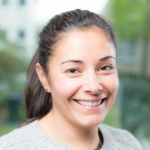Title:
Soil redox dynamics mediated by interacting biological and physical processes during Managed Aquifer Recharge Abstract:
Managed aquifer recharge (MAR) strategies hold potential for improving groundwater quantity for crop irrigation, yet they also pose risks to groundwater quality. The introduction of exogenous water into the subsurface, whether by flooding or well injection, creates geochemical gradients in redox potential, pH, and major ion compositions. In turn, these gradients can induce dissolution reactions in the aquifer matrix that can mobilize geogenic contaminants with the percolating water. This work aims to elucidate the impact that MAR has on redox shifts in the vadose zone, understanding that this change is at the heart of both arsenic and uranium mobilization. We pose that redox potential transients arise from the interplay between imbibition of the vadose zone with oxygenated water, limitations in atmospheric gas exchange across the soil-water interface, and oxygen respiration by microbial activity. We simulate water infiltration dynamics and reactive transport of oxygen from a drywell at a typical wetting-draining schedule and compare the timescales of biological reaction to those of physical transport to explain the observed trends. Our results reveal that the magnitude and persistence of redox shifts are limited in spatial extent and duration, whereby microbial respiration and dilution work together to efficiently mitigate the geochemical changes caused during MAR. A deep understanding in the controls for biogeochemical shifts is imperative to provide substantive guidance on sustainable water management strategies and to reduce potential long-lasting impacts on contaminant mobilization. Bio:
Verónica L Morales is the Orlob Endowed Professor of Water Resources Engineering at the University of California at Davis. Her research uniquely integrates pore-scale experimental insights with advanced upscaling models to better understand and mathematically describe flow and reactive transport processes in the subsurface with particular emphasis in colloid filtration. Her work is largely motivated to improve our understanding of the controls that topological complexity of the porous medium plays in fluid flow distribution and reaction hotspot emergence. Her current research on microbe-fluid interactions in porous media aims to unveil the microbial-mediated processes that drive greenhouse gas emissions, redox dynamics, and geogenic contaminant mobilization. Recognition of her scientific contributions include the Hydrologic Sciences Early Career Award by the American Geophysical Union, the NSF CAREER award, and the University of California Hellman Fellow.
|

